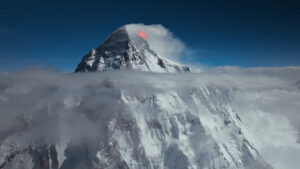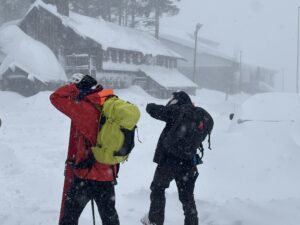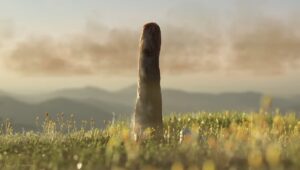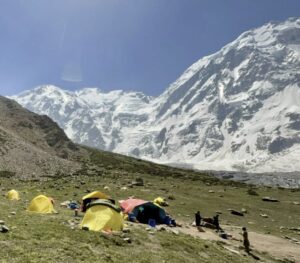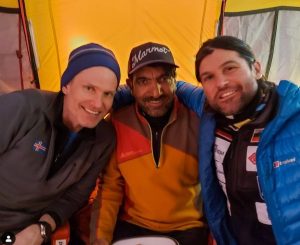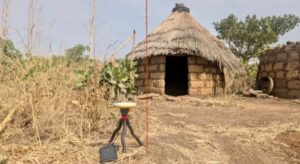My home is not a house or a place, it’s a feeling
(Pythom.com/Tina Sjogren) “A man gets tied up to the ground. He gives the world its saddest sound.” Few really pay attention to this line in the classic song ‘El Condor Pasa‘. Fewer even rise against the cards they’ve been dealt.
One who did, just arrived on Mount Everest. He reached the mountain from the streets of Belgium, biking much of the way, ready to attempt the peak as one of the few remaining independent mountaineers. He’ll share the rope work and climb without oxygen.
Jelle Veyt is no stranger at Explorersweb. In his previous Everest attempt he told us the reason behind his approach to life; once down how he got back up, and why he is biking around the world to climb exotic peaks, one of them the tallest this planet has to offer.
We caught up with him a few weeks ago on his way back to Everest and here goes our follow-up chat.
Pythom: You biked to Everest on previous attempts, what’s your approach this time?
Jelle: This year I biked from KTM to Phaplu. I started where I left off last time (was forced to because of the circumstances). It’s a beautiful cycling trip but really hard, a jeep takes this road at less than 30km/h average. From Phaplu I started trekking towards Gokyo where my friend Dawa Steven Sherpa (Asian Trekking) owns a lodge. Following acclimatisation hikes up to 5500m I will cross the Cho La pass to arrive in EBC the 14th of April.
Pythom: What’s your plan this season in terms of logistics and acclimatization?
Jelle: I came earlier this year to acclimatise properly and be fully prepared to attempt Everest without oxygen. I want to work on the mountain like I did last year, when I was helping out in the ice fall with the Ice Fall doctors and Damien (from the Benegas brothers) fixing ladders and breaking trail. I’ll try and help setting up route or tents when possible. I’m climbing with Asian Trekking who are really good friends of mine and always have a strong team.
Pythom: According to reports Everest south side is quiet this year, is that your take as well?
Jelle: I’ve been here for a month already and yes, I see less people from previous years. I heard less permits were issued too and that there are more people on the North side. The government announced they would extend permits only one month ago and for obvious reasons not everyone can get off from work or prepare to climb Everest one month before the season starts.
I just kept training and preparing for this climb; 25-30hrs a week in the last 6 months, and feel ready for this mountain.
One of the things I’ve learned during my time on the streets is that I take my home anywhere. My home is not a house or a place, it’s a part in my life where I feel best. I learned to feel free in being anywhere. Since I don’t have a house, apartment or a car my only expenses right now now are here in Nepal.
This way I can easily take off for a couple of months and just crash with family and friends when back Belgium until the next project.
Pythom: You’ve been on the peak in turbulent times: what is your biggest lesson from those attempts and what do you hope will be different this year?
Jelle: I’ve learned that everything is possible in the mountains. I thought I already knew that, but then this earthquake hit us, destroying EBC.
It was a personal reminder for me that I can keep calm during stress, I think my life on the street taught me that. I accidentally filmed myself running from the avalanche with my GoPro. Reviewing the video I could hear myself calling out my friend’s name who was also in the avalanche. I’m happy that I thought of others safety as well as mine automatically, you only know that when you experience a life threatening situation.
Another thing I re-learned is to be humble and treat every moment in life as a gift. I hope this year will be a successful one for all expeditions, I got the feeling a big part of the world is watching Everest. What happens to Nepal tourism is probably dependent on what happens in the next 2 months, especially on Everest.
Pythom: You went from the street to the Himalayas. We just followed an Amazon expedition where one of the explorers used the trip to escape drug addiction. With drugs and homelessness on the rise in Europe and US, this is a fascinating story. How did adventure help you get your life around and what would be your 3 most important advice to someone in that situation?
Jelle: Living on the street is an adventure on its own. That’s where I first learned survival. I had to find water, places to sleep in abandoned buildings, things like that to meet my basic needs. I learned to make an oven from a survival handbook. My friend baked a quiche in it from ingredients we picked up dumpster-diving at food stores.
Another time I went on a 2 week biking trip to France with a few friends. We borrowed a tandem, camped in a tent and ate out of supermarket bins. I think it was then I realised how nice it can be to travel this way. It gave me time to think and understand that my life ain’t that bad, that I actually don’t have a home not because I can’t, but because I have other values. It made me realise I can do great things and don’t have to give up. It taught me failure is not the end but a chance for a new beginning.
Had I stopped at every failure I wouldn’t be on Everest right now.
As for drug addiction, I think it’s important not be too hard on yourself if you relapse. It’s a weak moment, not a failure, and it happens to all of us. I was lucky to never get addicted to drugs but I know people who did, or are addicted right now.
I see failure as a new opportunity. Take this my 3d attempt on Everest as an example. After the first tragedy I returned to Belgium thinking I would prepare even better for the mountain and I did. I’ve followed the same reasoning since, and now I’m back more ready than ever. I admit it wasn’t always easy, I had some dark moments back home in Belgium, but after a while, you have to pick yourself up.
Another important thing is to dream! Dream big, make smaller goals that lead towards the big one and evaluate once in a while if you’re still on track. And if you aren’t, there is no shame in changing your goals either.
When not out pedaling and climbing Jelle Veyt works in a group physiotherapy practice in Belgium. He loves the simple things in life: doing sports, having a drink with friends, and contemplates picking up his violin again. “I played it as a child but quit. I’m sorry I didn’t keep at it so I’ll pick it up again, since I hate regrets,” he told us. His favorite read is Steppenwolf by Herman Hesse.
Tying in to the El Condor Pasa analog that started this interview, Jelle says he knows some people feel they need to live up to expectations from family and friends forcing them to do career choices they may not have chosen for themselves. “They do what they don’t really want to and that’s what builds up the pressure and can make people depressed,” he says. “I’m happy my family and friends are not like that but support me in my happiness.”

